ASTANA – As Terhi Hakala concludes her tenure as the European Union’s Special Representative for Central Asia, she reflects on the evolution of EU-Kazakhstan relations during her time in office. In an interview with The Astana Times during her farewell visit to Kazakhstan, Hakala shared insights into key milestones, critical areas of cooperation, and her overall thoughts on the partnership between the EU and Kazakhstan.
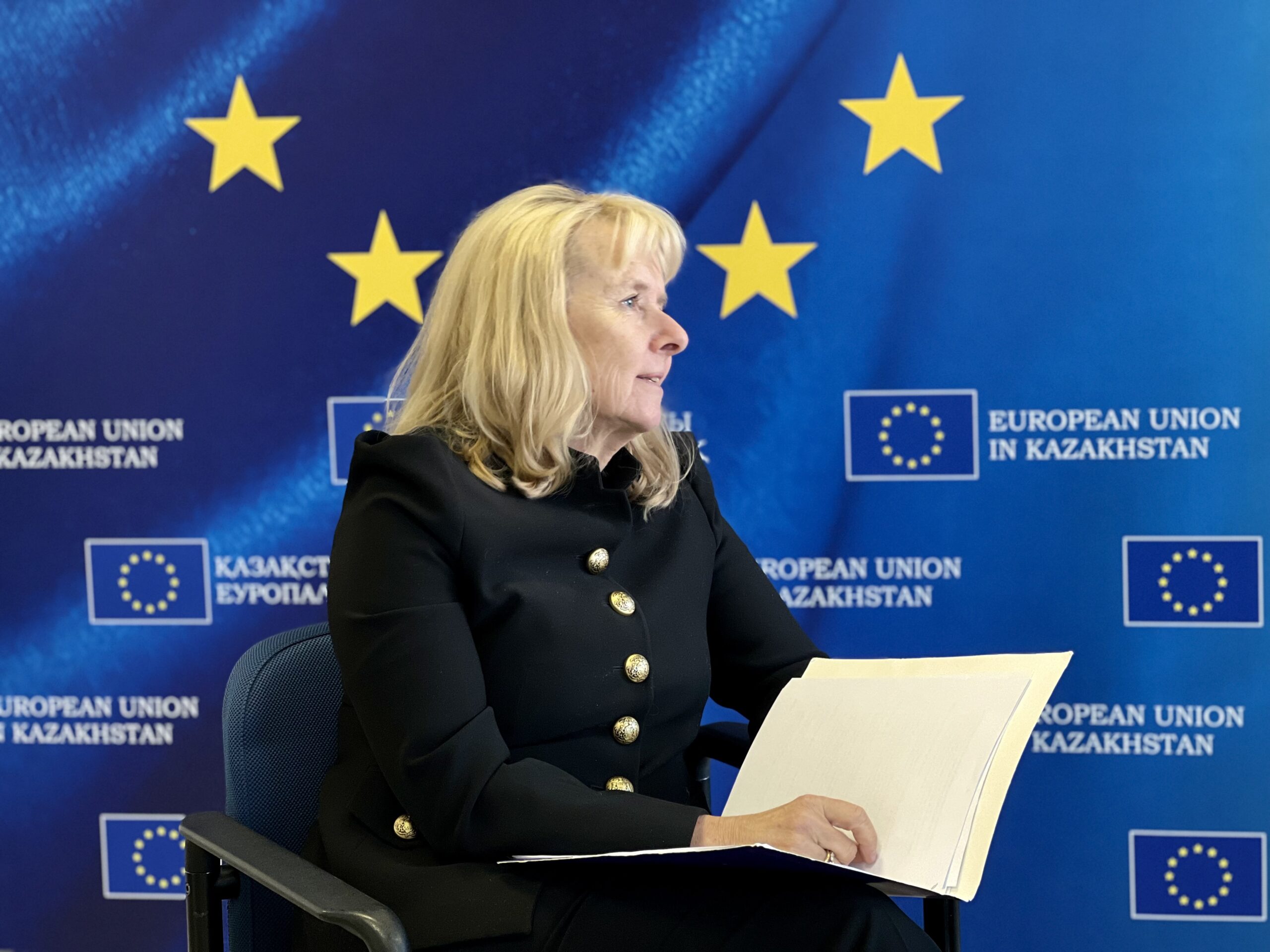
Hakala assumed the role of EU Special Representative for Central Asia in 2021. Photo credit: Aida Dosbergenova
“I have been three and a half years in this job. I must say that I am happy that I have been able, during these three and a half years, to contribute to the positive development of relations between Central Asia and the EU. Our relationship has deepened and strengthened. We have been able to raise the level of our interaction and widen the scope – from leaders to civil society and business communities,” said Hakala, a Finnish diplomat who has served in this role since July 2021.
She acknowledges that her tenure coincided with a tumultuous period in global affairs.
“A month after I entered this job, a regime change happened in Kabul. Then, we had the January events, the tragic event in Kazakhstan. Then, the Russian aggression in Ukraine,” she said.
As she prepares to hand over her responsibilities, Hakala said she feels “gratitude and pride” that the ties between the EU and Central Asia continued to thrive even in such turbulent circumstances.
“I am very happy that Central Asia and the EU are now closer together than ever,” she added.
She emphasized the significance of the meetings of the leaders of Central Asian countries and the EU in Astana in October 2022. The second meeting took place in Cholpon-Ata in June 2023.
She also stressed the importance of a Joint Roadmap between Central Asian countries and the EU adopted at the ministerial meeting in Luxembourg in 2023. The roadmap sets forth an ambitious and comprehensive framework to enhance collaboration. It prioritizes key areas such as inter-regional political dialogue, bolstering trade and economic ties, advancing energy cooperation, transitioning to a climate-neutral economy, improving connectivity, tackling shared security concerns, and fostering people-to-people exchanges and mobility.
Kazakhstan is a strategic partner of the EU
Hakala noted Kazakhstan has played an essential part in driving this rapprochement between the EU and Central Asia. As the first country in the region to sign the Enhanced Partnership and Cooperation Agreement (EPCA) with the EU, the nation has hosted a series of high-profile events that have deepened bilateral ties, including the meeting of the leaders of Central Asia and the EU, and an economic forum.
“It [Kazakhstan] plays a very important role, actively promoting cooperation. It is very active, but also, in a way – everyday, pragmatic cooperation, which is going on with Kazakhstan,” she said.
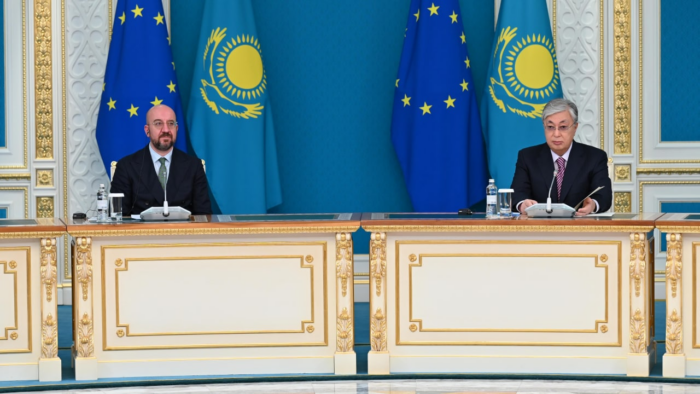
European Council President Charles Michel and Kassym-Jomart Tokayev at a press conference during Michel’s visit in October 2022. Photo credit: Akorda press service
The EPCA, which came into force in March 2020, has served as a cornerstone for the relationship between Kazakhstan and the EU. The visits of European Council President Charles Michel to Astana in October 2022 and Josep Borrell, the EU’s High Representative for Foreign Affairs and Security Policy and Vice-President of the European Commission, in November 2022, marked significant milestones in advancing EU-Kazakhstan relations.
Kazakhstan remains the EU’s largest trade partner in Central Asia, but Hakala is sure there is room for growth.
“Let’s face it, there are plenty of opportunities and room to improve the trade volumes. This is, of course, for the business community to take action, but Kazakhstan is also reforming the economy. Kazakhstan is taking big steps in other reforms,” she said, adding that these reforms can pool investors.
Data from the European Commission shows that the EU accounts for 37% of Kazakh exports and 27.9% of its total trade in 2023.
Last year, trade between the EU and Kazakhstan reached a robust 42.4 billion euros (US$44.7 billion), reflecting a 5.6% increase compared to 2022. EU exports to Kazakhstan surged by 17.2%, amounting to 12.1 billion euros (US$12.8 billion), while imports from Kazakhstan rose modestly by 1.6% to 30.3 billion euros (US$31.9 billion).
Critical areas for the coming decade
“I think that the sky is the limit, as they say in what we can do with Kazakhstan in the coming years,” said Hakala.
Beyond trade and investment, Ambassador Hakala emphasized solid cooperation with civil society and the media. “We are having a very intense dialogue with civil society and journalists,” she added.
As she reflected on the future of bilateral relations, Hakala pointed out several areas that will draw attention.
Among these, connectivity is a key area of focus. EU and Kazakhstan have worked closely in transport and logistics, including on the development of the Trans-Caspian International Transport Route (TITR). Astana hosted the launch of a coordination platform for developing this route in June.
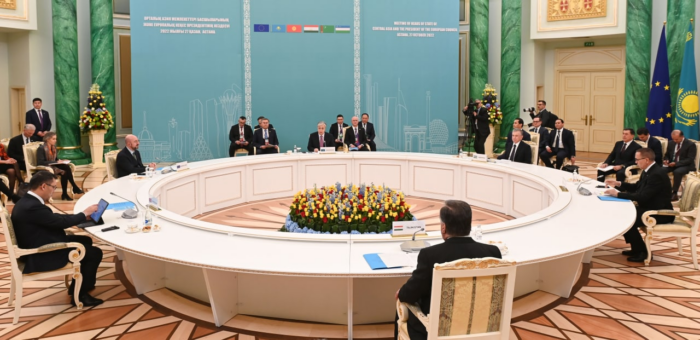
Central Asian leaders and European Council President during the meeting in Astana in October 2022. Photo credit: Akorda press service
The EU also pledged to invest in infrastructure projects in Kazakhstan, particularly for the development of the TITR, under its Global Gateway initiative.
“In this current situation, where we have underlined the importance of bringing Central Asia and Europe closer together, it is about connectivity – tying the regions better. It has been a plan for years, but now there is an absolutely serious start to that process,” she said.
Connectivity, she noted, is not just about building physical infrastructure but taking soft measures – simplifying regulations and streamlining border and customs procedures.
Hakala also pointed to security, climate action, and education as other critical areas for collaboration.
“The other one is to improve our cooperation in security because we live in a world today where new technologies also give us serious threats when it comes to disinformation and hybrid operations. That is linked to the threat of terrorism, for instance, from Afghanistan. It will increase the challenges that we all have in today’s world,” said the EU diplomat.
Hakala also sees substantial untapped potential in education, including through EU-funded programs, such as Erasmus Plus, Horizon Plus, and Darya. The latter is a pioneering regional initiative aimed at enhancing the skills and employability of young people across Central Asia. The name stands for Dialogue and Action for Resourceful Youth in Central Asia.
“We have to increase that cooperation because there is a lot of willingness and eagerness to come to Europe for studies. By improving that cooperation, we can also create more opportunities for businesses and people who understand the European way of doing business,” she said.
Visa facilitation
Hakala also highlighted the importance of fostering closer ties between the EU and Kazakhstan through enhanced people-to-people connectivity. One significant area has been discussions about visa facilitation for Kazakh citizens traveling to EU member states.
“This is a process which will, of course, improve the opportunities, and now it is definitely a question of time when it [the negotiations] will be launched,” she said.
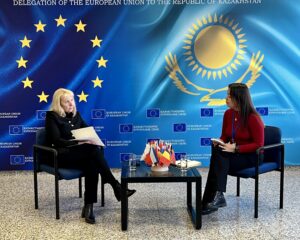
Ambassador Hakala and The Astana Times Senior Editor Assel Satubaldina. Photo credit: Aida Dosbergenova
While this topic is not in Hakala’s mandate, she hopes for progress. “I hope it happens sooner than later,” she added.
Hakala also expressed gratitude for the warm reception she received during her visits across the country. She reflected on her long-standing connection with Kazakhstan, recalling her first visit in 1992, shortly after the country gained independence. She said she has been fascinated by the pace of change in the country.
She expressed deep appreciation for the opportunity to work closely with Kazakh professionals and young people, highlighting the friendships and hospitality that enriched her experience.
“For me, it has been very nice to work with Kazakhstan and your professionals, to meet your young people and the friendship and generous hospitality you have shown me, enabling me to work better,” she said.
Meetings in Astana
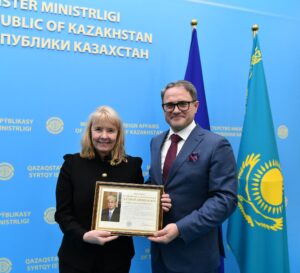
Terhi Hakala and Roman Vassilenko during their meeting in Astana. Photo credit: Ministry of Foreign Affairs
While in Astana, Hakala met with Deputy Foreign Minister Roman Vassilenko. Both diplomats expressed optimism about the progress made in strengthening bilateral and regional cooperation.
At the end of the meeting, Vassilenko presented Terhi Hakala with a letter of appreciation from the President of Kazakhstan Kassym-Jomart Tokayev and a special pin of the Barys award for her contribution to strengthening friendly relations between Astana and Brussels.
Hakala also met with members of the Kazakh Parliament, including Vice Speaker of Mazhilis Daniya Yespayeva.
